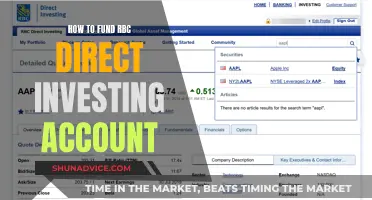
Mutual funds are a type of investment vehicle that pools money from multiple investors to purchase a diversified portfolio of stocks, bonds, or other securities. They are managed by professional fund managers and provide individual investors with access to a professionally-managed portfolio, potentially benefiting from economies of scale while spreading risk across multiple investments.
When investing in mutual funds, it is important to understand the different types of funds available, such as stock, bond, money market, index, and target-date funds, each with its own investment focus and strategy. The returns on mutual funds come from distributions of income from dividends or interest, and selling fund securities at a profit.
The timing of when a mutual fund invests deposits depends on its specific rules and guidelines. Most mutual funds execute trades once per day after the market closes, usually around 4 pm ET, and orders are typically posted by 6 pm. This means that if you place an order to buy or sell shares, it will be fulfilled after the day's net asset value (NAV) has been calculated. The NAV is the total value of the securities in the portfolio, minus any liabilities, divided by the number of outstanding shares.
It is worth noting that mutual funds are typically considered a long-term investment, and selling early or trading frequently may trigger fees and penalties. Additionally, mutual funds may impose limits or fines on certain types of trading activity to discourage excessive trading and protect the interests of long-term investors.
| Characteristics | Values |
|---|---|
| Definition | Pooled investments managed by professional money managers |
| Investment Vehicles | Stocks, bonds, currencies, indexes, cash, equities, money market investments |
| Benefits | Diversification, exposure to multiple securities, professionally managed, choice of funds, accessible |
| Risks | Market risk, interest rate risk, management risk, no FDIC insurance |
| Fees | Annual fees, expense ratios, commissions, sales loads, transaction fees, redemption fees, account fees, purchase fees, exchange fees |
| Settlement Period | 1-3 days |
| Trading Times | Once per day after market close |
| Investment Horizon | Long-term |
| Minimum Investment | $500 or more, some have no minimum |
| Lock-in Periods | Depending on the type of fund |
What You'll Learn
- Mutual funds are a safe investment option with diversified portfolios
- They are managed by professionals and are ideal for long-term wealth creation
- Mutual funds are traded differently from stocks and ETFs
- They are subject to various fees and charges
- Mutual funds are taxed differently from other investments

Mutual funds are a safe investment option with diversified portfolios
Mutual funds are relatively safe investments when compared to riskier investments like stocks. This is because they are pooled investments that hold a variety of assets in one basket. For example, a blue-chip mutual fund has many different company stocks. This gives the mutual fund a diversified portfolio, which helps mitigate the risk associated with holding one or more stocks on their own.
Mutual funds are an especially common investment for investors who don't want to pick and choose individual investments themselves but want to benefit from the stock market's historically high average annual returns. They are also a good option for those who want to benefit from compound interest and grow their money over time.
Mutual funds are also highly liquid, meaning they are easy to buy or sell. They are traded once per day at 4 p.m. ET after the close of the market. Orders are typically posted by 6 p.m. Trade orders can be entered through a broker, a brokerage, an advisor, or directly through the mutual fund.
Mutual funds are professionally managed investment portfolios that pool money from multiple investors with similar financial goals. They offer diversification and exposure to multiple securities, including stocks, bonds, and money market investments. Mutual funds are known by the kinds of securities they invest in, their investment objectives, and the type of returns they seek.
Mutual funds give individual investors access to diversified, professionally managed portfolios. They allow investors to gain exposure to a professionally-managed portfolio and potentially benefit from economies of scale, while also spreading risk across multiple investments.
Mutual funds charge annual fees, expense ratios, or commissions, which lower their overall returns. However, they are still a good option for those looking for a secure and diversified investment.
Mutual Fund Investment: Key Factors to Consider
You may want to see also

They are managed by professionals and are ideal for long-term wealth creation
Mutual funds are a great way to invest your money, especially if you are looking for long-term wealth creation. They are a type of investment vehicle that pools money from multiple investors, giving individual investors access to a diversified portfolio of stocks, bonds, or other securities. The fund is then managed by professionals who oversee the basket of securities according to the fund's goals and investment objectives.
One of the main advantages of investing in mutual funds is that they are professionally managed. This means that a fund manager actively monitors the fund's portfolio and makes investment decisions on behalf of the investors. This can be beneficial for those who may not have the time or expertise to invest directly in individual securities. The manager can devote more time to selecting investments and ensure that the fund is well-diversified, reducing risk.
Another advantage of mutual funds is that they offer investment diversification. By pooling money from multiple investors, the fund can invest in a variety of securities, rather than just a single stock or bond. This helps to spread the risk across multiple investments. Additionally, mutual funds provide access to global markets and investment opportunities that individual investors might not otherwise be able to access.
In terms of long-term wealth creation, mutual funds can be an ideal option. They are designed to meet different investment goals, including long-term growth. While there are no guarantees when it comes to investment returns, mutual funds have the potential for higher returns over the long term compared to other investment options like fixed deposits. However, it's important to keep in mind that mutual funds also come with certain fees and expenses, such as management fees and operating expenses, which can lower the overall returns.
Overall, mutual funds are a popular investment choice, especially for those looking for long-term wealth creation. With professional management, investment diversification, and access to a wide range of securities, mutual funds can be a great way to build wealth over time. However, as with any investment, there are risks involved, and it's important to carefully consider your financial goals and risk tolerance before investing.
Index Funds: Choosing the Right Investment Strategy
You may want to see also

Mutual funds are traded differently from stocks and ETFs
Mutual funds, stocks, and ETFs are all popular investment options, but they differ in how they are traded.
Mutual funds are traded only once per day after the market closes, whereas stocks and ETFs can be traded throughout the trading day and during extended hours. Mutual funds are traded directly between investors and the fund company, while stocks and ETFs are traded on the secondary market.
Mutual funds are bought or sold at the net asset value (NAV) of the fund, which is calculated after the market closes. The price of a mutual fund share depends on the performance of the securities it invests in. On the other hand, the prices of stocks and ETFs fluctuate continuously throughout the day based on supply and demand.
Mutual funds usually have a higher minimum investment requirement than ETFs and stocks. While some funds have no minimum investment, a typical retail fund requires a minimum investment of between $500 and $5,000. ETFs can be bought for the cost of a single share, and stocks can be purchased for as little as $1 with fractional share trading.
Mutual funds are actively managed by fund managers who decide how to allocate assets to beat the market. ETFs and stocks are passively managed, tracking market indexes or sector indexes.
Mutual funds, ETFs, and stocks may charge various fees and sales loads. Mutual funds may have sales loads, short-term redemption fees, transaction fees, purchase fees, exchange fees, and account fees. ETFs and stocks do not carry sales charges, but brokerage companies may charge a commission to buy and sell.
Best S&P Index Funds: Top Picks for Your Portfolio
You may want to see also

They are subject to various fees and charges
Mutual funds are subject to various fees and charges, which can be broadly categorised into two types: annual fund operating expenses and shareholder fees.
Annual Fund Operating Expenses
Annual fund operating expenses are ongoing fees that cover the cost of paying fund managers, accountants, legal fees, marketing, and other administrative costs. These fees are typically between 0.25% and 1% of your investment in the fund per year and are expressed as a percentage of the fund's net average assets. Actively managed funds, which aim to beat average stock market returns, tend to have higher annual fund operating expenses than passively managed funds, such as index funds.
The ongoing costs that make up annual fund operating expenses include:
- Management fees: The cost of paying fund managers and investment advisors.
- 12b-1 fees: Fees capped at 1% that cover the cost of marketing, selling the fund, and other shareholder services.
- Other expenses: These may include custodial, legal, accounting, transfer agent expenses, and other administrative costs.
Shareholder Fees
Shareholder fees are sales commissions and other one-time costs incurred when buying or selling mutual fund shares. These fees are typically outlined in the fund's prospectus, a legal document that each mutual fund is required to file with the SEC.
Shareholder fees include:
- Sales loads: Commissions paid to third-party brokers when buying or selling mutual fund shares, typically ranging from 2% to 5% of the total investment.
- Redemption fee: A fee charged by some funds if you sell your shares within a specified period after purchasing them, usually ranging from a few days to over a year.
- Exchange fee: A fee charged by some funds if you transfer your shares to another fund offered by the same investment company.
- Account fee: A fee charged to maintain your account, often applied if your balance falls below a specified minimum investment amount.
- Purchase fee: A fee paid to the fund at the time of purchase, distinct from a front-end sales load, which is paid to the broker for selling the fund.
In addition to the fees outlined above, some funds may also charge transaction fees for buying or selling mutual funds, typically ranging from $10 to $75.
Vanguard Funds: Best UK Investment Options
You may want to see also

Mutual funds are taxed differently from other investments
Mutual funds are a popular investment vehicle, allowing investors to pool their money together to be managed by professionals. They are known for their diversification and exposure to multiple securities, including stocks, bonds, and money market investments.
One of the significant benefits of investing in mutual funds is their tax efficiency. However, it is essential to understand how mutual funds are taxed, as the rules differ from those of other investments.
Taxation of Mutual Funds
Mutual fund gains and profits are subject to taxation, and there are several variables that affect the tax liability:
- Fund Types: For tax purposes, mutual funds are divided into various groups, such as Equity-Oriented Mutual Funds and Debt-Oriented Mutual Funds.
- Capital Gains: When a capital asset, such as a mutual fund unit, is sold for more than its purchase price, a profit known as a capital gain is made. The tax rate on capital gains depends on the holding period and the type of mutual fund.
- Dividends: Dividends are a portion of the accumulated profits distributed to investors by the mutual fund house. Dividends are taxed differently than capital gains and are subject to taxation at the time of distribution.
- Holding Period: The time between the purchase and sale of mutual fund units. According to income tax regulations, a longer holding period results in a lower tax amount.
Differences in Taxation
The taxation of mutual funds differs from other investments in several ways:
- Tax Efficiency: Mutual funds are known for their tax efficiency, which is one of their most significant benefits.
- Taxation of Capital Gains: Capital gains in mutual funds are taxed based on the holding period and the type of fund. Short-term capital gains (held for less than a year) are taxed at a higher rate than long-term capital gains.
- Taxation of Dividends: Dividends offered by mutual funds are taxed at the investor's income tax slab rate. Previously, dividends were tax-free as companies paid the dividend distribution tax (DDT).
- Securities Transaction Tax (STT): When buying or selling units of an equity fund or a hybrid equity-oriented fund, a separate tax called the STT is levied by the government. This tax does not apply to the sale of debt fund units.
Understanding the taxation of mutual funds is crucial for investors, as it can impact their overall tax expense and investment returns. The tax rules for mutual funds differ from those of other investments, and investors should be aware of these differences to make informed decisions. By considering factors such as fund types, capital gains, dividends, and the holding period, investors can optimise their tax liability and maximise their returns.
The Mindset of Investment Fund Managers: Traits and Insights
You may want to see also
Frequently asked questions
There is no one "best time" to invest in mutual funds. It is recommended to start investing as early as possible and to invest regularly.
You can buy mutual fund shares directly from the financial company that manages the fund, or through an online discount broker or a full-service broker.
Mutual funds charge annual fees, expense ratios, or commissions, which lower their overall returns. Some also charge load fees, which are essentially commission charges.
Mutual fund shares are highly liquid and can be bought or sold on any day the market is open. However, mutual funds trade only once per day, after the markets close at 4 p.m. ET.







